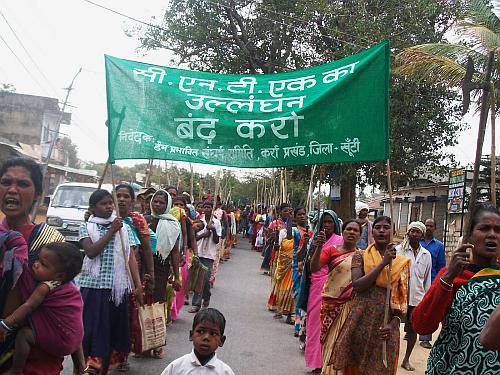Birsa Munda died at the mere age of 25, in Ranchi Jail, in the year 1900. By then, he was already a celebrated leader in the entire Chhotanagpur region. He rallied an army of at least 400 men, and started his own religion and people flocked from far off lands. He was not just a hero of an independence revolution not many Indians know about, he was a legend. The Ranchi Airport, Universities such as the BAU, BIT Sindri, the major road in front of my house NH 75, even small things such as a food plaza is named after him, in this small capital town. He left such a major impact in his short life that the British government had to make laws to protect the interests of the tribals (and their own). These ancient laws, still exist.
In simple words, the Chhotanagpur Tenancy Act – CNT act, ensures that the lands occupied by the tribals, were not to be sold off to anyone besides someone of their own tribe, or someone who lives in the same area (police station). Later on, the Bihar Assembly amended it to include several backward classes as well. Today, when you travel down the Birsa Munda Road (NH 75) which divides Ranchi in equal East and West, you will come across strange distribution of civil construction. You will find acres of barren land, every few kilometers, on the either side, even as close as 5 kilometers from the city center. This particular piece of land is left barren, and I saw it every day going to school. Reason? The CNT act.
Big corporations like Tata, Reliance, and Hindalco eyed pieces of land throughout Jharkhand, but could not find any undisputed land. The state provides massive amounts of coal and water, the base for any industry, but CNT hindered every way and all industrial development, not just at the large level, but at personal level as well, as it prohibited the owners from using their own land for commercial purposes. The CNT act is definitely a necessity in Jharkhand to make sure the economically weaker sections of society are not robbed off their lands by corporates. But, the law is dated, even after facing several amendments, disallowing all progress and development.
In contradiction to the popular belief, the CNT Act allows reselling of tribal land to non-tribals under Section 49. This can be done only for industries or agriculture. There are however several restrictions and procedures that are specified in CNT act. It does however require the permission from the revenue department. Most industries are not set up here because of:
1. Political agendas of parties like Jharkhand Mukti Morcha
2. Lack of knowledge about the CNT act in tribals
3. The process of acquiring land is long, clumsy, time taking and even if you are successful, there is always a chance that the tribals will demand the land back, backed up by politicians like Shibu Soren. Several such cases are pending in the court.
The unhappy Builders’ lobby have been asking for 2 things for a long time: To trim the list under the CNT Act of 1962 keeping only the extremely backward ones. This would free up a lot of land. Secondly, to change the 1981 amendment which extended the law to municipal areas as well. This will free up MAJOR COSTLY land inside the cities of Ranchi and Dhanbad.
For a century The CNT Act has stood tall, yet there have been major instances of illegal land acquisition.
This is because, no matter how difficult you make the acquisition of land, someone will break it. The key to stopping tribal land abuse is not just one law, it is education. The panchayats, ward councilors, block and district officers should reach out to the people and make them aware of their rights and help them not becoming an asset to the politicians.
Even being by the source of major minerals and resources like bauxite, coal, forestry, Jharkhand has witnessed little industrial or commercial development. Some major expected changes in this law included:
1. Absolute inclusion of tribal and natives of Jharkhand as the workers at every possible level in a factory or industry.
2. Simplifying the law and its sections
3. Allowing the land to be used for commercial purposes
4. Making the law according to current realities. For example, a tribal land should be allowed to be sold to anyone of that tribe from the entire state and just that area.
5. Amending reselling laws to be more commerce oriented in the Santhal Paragna in SP Act (North East Jharkhand), including roads, housing, and public buildings such as schools and hospitals.
While the amendment of 25th November has shown promise and has included a few of those demands mediating the both sides, trying to improve the chances of development, there is still a long way to go. Industrialization is a necessary and unavoidable part of a developing economy, and we cannot avoid it. For the first time since its existence, Jharkhand has seen a proper government. (It once had a 13 day long government too.) The tribal student unions should first read and understand what the amendment is (it’s not clearly out and opposition is faking a lot of rumors) then act, instead of resorting to hooliganism on the street. While, they couldn’t get much support from the rural sector where the law actually matters the most, the student unions are not able to see that allowing the commercial use of their own land will not create any ease for the corporations to usurp their lands.
